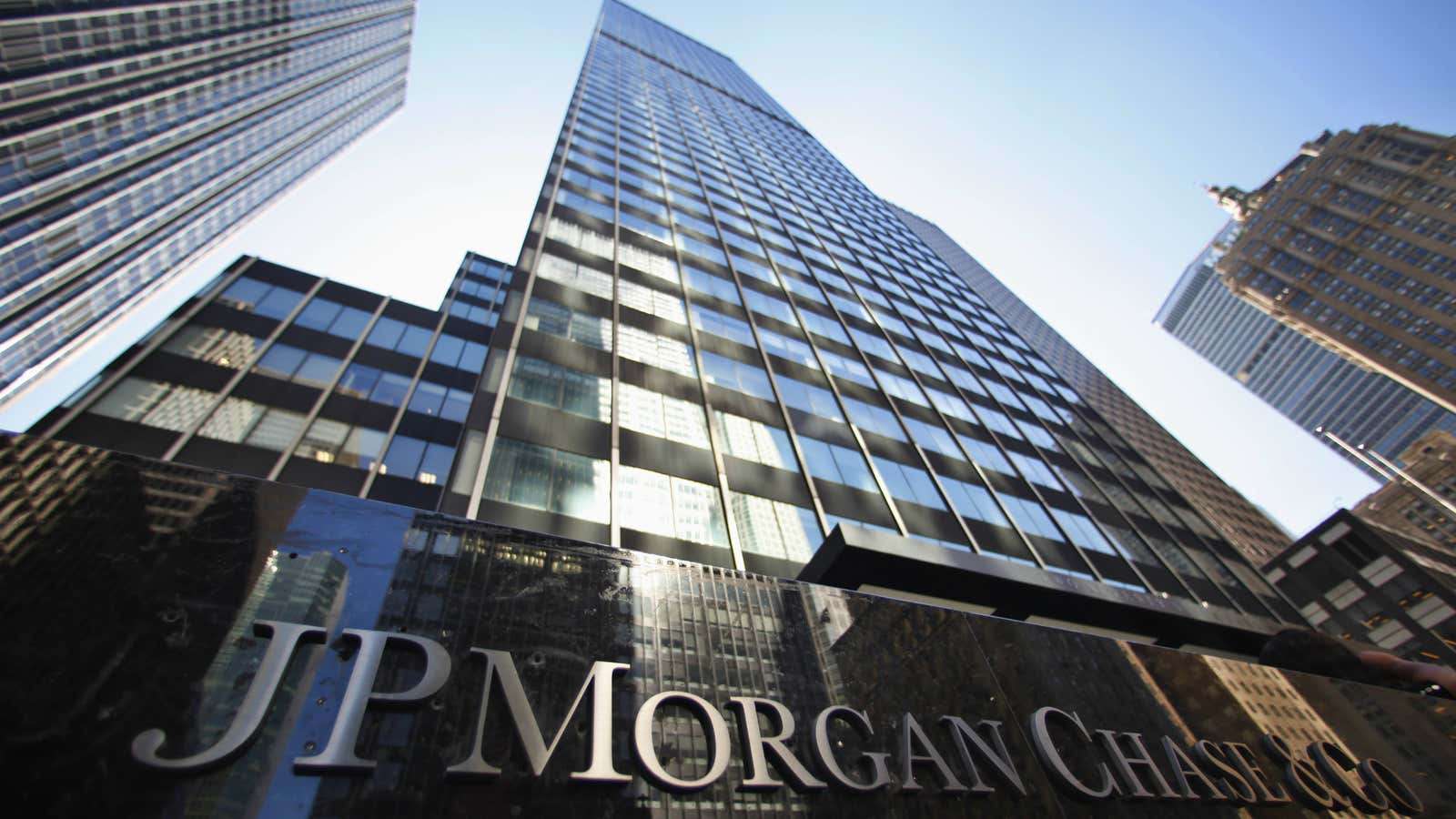A lasting debate since the last financial crisis is whether banks are still too big to fail. In the US, there are fewer of them and they are indeed bigger than before the panic in 2008.
Mary Callahan Erdoes, who heads JPMorgan Chase’s asset & wealth management division, said in Davos, Switzerland, this week that being a colossus may be the only way to survive:
“Today it is really hard to imagine not being a bank at scale. I can’t imagine having to figure out how to protect yourself from a cyber perspective or tech perspective—we spend $10 billion a year on technology. We have 50,000 technologists, that’s the size of like most firms in total. We spend three quarters of a billion dollars just on cyber protection. To keep up with that is really, really hard.”
Her humble brag at the World Economic Forum doesn’t explain how much of that money and IT staffing is necessary to simply keep older systems running, rather than innovating on, say, artificial intelligence and whizzy apps. But the biggest US bank by assets indeed has formidable tech resources. By Erdoes’ count, JPMorgan has more than four times more technology employees than payment company Square employs overall. And regulations have of course become more onerous since the crisis, potentially stifling smaller entrepreneurs.
During the same panel, Bank of England governor Mark Carney and the managing director of the International Monetary Fund were less sure that smaller startups won’t find a way to compete. Carney said he was wary of waving “a fintech wand” intended to solve everything, but said he could foresee greater competition for small- and medium-size enterprise lending coming from upstart tech firms.
The IMF’s Christine Lagarde also cautioned larger banks not to overlook the threat coming from fintech: “They are going to come and shake the system,” she said. ”Many of the large banks actually know that, have internalized that and are taking measures to either include them or move in the same direction.”
There are signs of Lagarde’s vision playing out. It’s an imperfect comparison, but banks have been wary of Venmo, the millennial-preferred method swapping money, which now has more active users than some major banks’ deposit accounts, according to estimates from ARK Invest, an advisory and research firm.
For investors, bank valuations are based in part on core deposit and loan relations, which works out to about $3,400 per US demand deposit, according to an ARK report. Digital wallets are cheaper to operate, with no costly bank branches to staff, and there’s scope for vast cross selling, from mobile phone insurance to investing. If new-breed payment accounts were valued more like bank customers, ARK analysts think wallet providers, like Apple Pay, Amazon, and Square, could be worth around $700 billion in 2023.
US banks have pushed back with efforts like Zelle, a peer-to-peer payment system. This week, Early Warning Services, which operates Zelle, said the network has grown to 100 million consumers. By comparison, PayPal has more than 254 million active accounts, and Venmo has around 32 million, according to ARK estimates. Some 229 financial institutions, including JPMorgan, have signed up, while 60 of them are live and processing transactions. JPMorgan is also reportedly in discussions with Amazon to roll out a checking-account-like (paywall) service.
A favorite joke at Davos is that the forum is the contrarian indicator—if there’s consensus among the elites at the Swiss conference, then it’s time to bet against whatever they’re saying. (And for what it’s worth, Hugo Shong, founding chairman of IDG Capital, said during the same panel that he’s excited about Chinese fintech.) Even so, bank bosses would be well served to hope for the best—while taking Lagarde’s advice.
The future of finance on Quartz
- Apple Pay is a sleeper hit for the company’s services unit. Some 74 of the top 100 US retailers by revenue now accept Apple’s digital wallet.
- The US government shutdown may already ripple through the IPO market for months. It’s one of the ways the self-inflected injury is taking its toll on one of America’s greatest resources.
- Socially conscious investing has quadrupled in the past decade. Environmental, social, and governance (ESG) investments account for $1 in every four invested in the US (but the definition of ESG matters).
- Harvard economist Kenneth Rogoff says there’s no chance of cryptocurrency dislodging major fiat currencies. He likened them to a lottery ticket on dystopia.
- One of India’s most celebrated woman bankers has been booked in a $242 million fraud case. The nepotism scandal at India’s ICICI Bank is getting murkier.
The future of finance elsewhere
- Barclays and Santander made a £26 million investment (paywall) in MarketInvoice, likely valuing the British fintech at about £85 million ($111 million).
- The European Commission handed Mastercard a €570 million ($650 million) fine. It said the US company prevented consumers from using cheaper banking services outside their home country.
- Alipay got an e-money license in Luxembourg. The Chinese fintech says it has more than 1 billion users around the world.
- The former head of Fannie Mae has joined mortgage startup Blend. For most consumers, getting a mortgage “is probably the worst financial services experience they have,” he told the Wall Street Journal (paywall).
- Latin America has a new fintech unicorn: Argentine payments company Prisma Medios de Pago was recently valued at about $1.42 billion. The company is a joint venture between Visa International and local banks.
Previously, in Future of Finance Friday
Jan. 11: A cashless society is dangerously disruptive for the poor, elderly, and homeless
Jan. 4: How’s that prediction for the utter disruption of the finance industry going?
Dec. 21: Big tech companies prefer the Federal Reserve over blockchain
